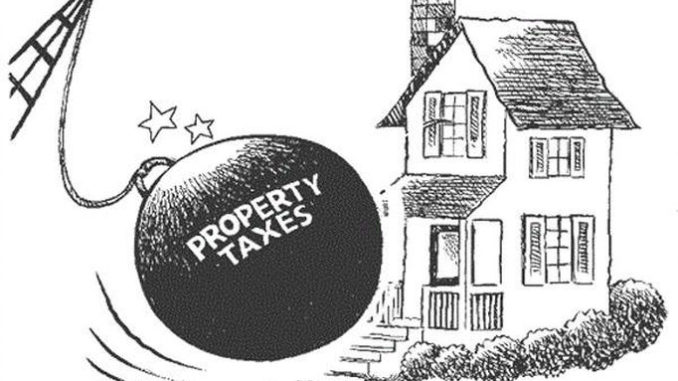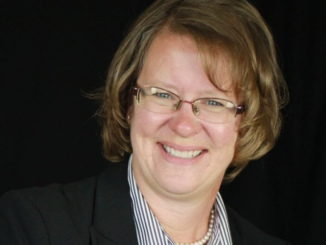
Folks around the State of North Dakota are receiving their property tax bills. And reports are that expected hikes have once again become a reality for many "property owners".
We wrote back in April that the finger pointing had once again begun between state and local governments on the issue of property tax. In September, we followed that up with an article about the lies being perpetrated by the House and Senate Majority Leaders in the North Dakota Legislature regarding the issue . Then in October, we ran a guest article by Bob Hale exposing multiple problems associated with the topic.
As a result of the property tax increases, calls are now being made to "bring back Measure 2". In case you’re not familiar with what that means, Measure 2 was the initiated measure, put to the ballot in June of 2012, that sought to abolish property tax in North Dakota .
Initially, the efforts by a group known as "Empower the Taxpayer" to eliminate property tax were well received. But unfortunately, a special interests group that called itself "Keep It Local North Dakota" organized and perpetrated a campaign of fear upon North Dakotan’s.
With campaign contributions totaling $579,140; KIL-ND attempted to convince everyone that if property taxes went away everything from K-12 education to local emergency services would cease to exist as we know them. Empower the Taxpayer did what they could to counter, but they were horribly underfunded with just $21,760.41 in contributions. In the end, KIL-ND won out and Measure 2 was defeated with over 76% of the vote opposing it.
Aside from Empower the Taxpayer being out-funded by the opposition, there were concerns North Dakotan’s expressed about the measure as well. One of the big ones was in relation to the funding of K-12 education. In short, how are we going to pay for it if we eliminate property taxes? It’s a valid question.
Let’s first consider what the North Dakota Constitution says about providing for education by looking at Article VIII, Sections 1 & 2:
Section 1. A high degree of intelligence, patriotism, integrity and morality on the part of every voter in a government by the people being necessary in order to insure the continuance of that government and the prosperity and happiness of the people, the legislative assembly shall make provision for the establishment and maintenance of a system of public schools which shall be open to all children of the state of North Dakota and free from sectarian control. This legislative requirement shall be irrevocable without the consent of the United States and the people of North Dakota.
Section 2. The legislative assembly shall provide for a uniform system of free public schools throughout the state, beginning with the primary and extending through all grades up to and including schools of higher education, except that the legislative assembly may authorize tuition, fees and service charges to assist in the financing of public schools of higher education. (Emphasis Added)
There are key aspects to these sections of the Constitution that must be considered. First, it is the "legislative assembly" that is responsible for the "establishment and maintenance" of public schools. And to be even more clear, it is this same legislative assembly that is constitutionally mandated to "provide for" this "system of free public schools".
Let’s consider the legal definition of "provide". Black’s Law Dictionary defines it as:
"1. An act of furnishing or supplying a person with a product. 2. The allocation of resources, being money or goods, to allow a project to proceed to completion or the next stage." (Emphasis Added)
Now, certainly there are legislators and others that will argue that there are alternative definitions of "provide" that don’t involve money. So, let’s consider another key piece of evidence.
There is a book written by Elwyn B. Robinson called "History of North Dakota" that is used in college courses throughout the state. Published in 1966, it is a 599 page book covering the state’s history. And on page 478 we find this little gem in the discussion of education and North Dakota’s Constitution:
![]()
As you can see, our state’s constitution was set up so that the state was responsible for education, but they "shirked" the responsibility. And they’re still shirking their full responsibility today. (Note: If you’re interested in purchasing this book, click here. And no, this link is in no way connected to The Minuteman.)
Let’s consider the State Constitution further and look to Article X, Section 1:
Section 1. The legislative assembly shall be prohibited from raising revenue to defray the expenses of the state through the levying of a tax on the assessed value of real or personal property.
It’s clear from this section that the legislative assembly cannot raise revenue through property tax to meet their constitutional obligations. And what is one of these obligations? We’ve already shown it to be education– more specifically, K-12 education.
So, is it economically feasible in these days following the Bakken Oil Boom for the legislature to fully fund K-12 education? A recent document prepared for the Interim Government Finance Committee may provide some answers.
As you will see in the document, K-12 funding has nearly doubled over the period of time from 2006 – 2016. Over that same period, the state’s portion has increased from 47% to 73.3% when considering local, county, and state resources together.
As of the 2015 – 2016 school year, the state’s contribution came in at $967,408,131– yes, that’s nearly $1 Billion.
But here’s the shocking thing… while the K-12 funding has nearly doubled, enrollment has increased by just less than 13%.
And get this… the state would only have to return to the K-12 funding level of five years ago (2010 – 2011) in order to cover the combined total of local, county, and state resources at $943,350,078. And if they chose to fund it at the 2015 – 2016 state funding level, it would still represent a funding increase of over 30% in comparison to 2006 – 2007… without raising taxes!
In addition to all of this, we haven’t even considered the fact that there is currently over $4 Billion – and growing – in the Common Schools Trust Fund that was set up in our State Constitution "for the support of common schools". That money is apparently largely invested in Wall Street at the moment. Not to mention that the department responsible for these investments received a scathing audit last year.
Okay, I’ve thrown a lot of figures at you. In a nutshell, not only am I making the case that the state is constitutionally responsible for fully funding K-12 education, but it can be done without raising any other taxes.
Interesting enough, this last Legislative Session Rep. Scott Louser (R – District 5) sponsored House Bill 1388 in an effort to have the state fully fund K-12 education. The majority of his colleagues voted to continue shirking their constitutional obligation by defeating the bill 62 – 29. You can see video of the floor debate here.
The largest piece of the property tax pie was later picked up by the legislature when they took on the responsibility of fully funding our bloated Social Services. Now they need to completely put an end to an unconstitutional means of funding K-12 education by removing the property tax as a funding mechanism. Not only is it possible, but they’re violating their oath of office so long as they refuse to do so.
Sources:
1. https://theminutemanblog.com/single-post/2017/04/17/Property-Taxes-Let-the-Finger-Pointing-Begin-Again
2. https://theminutemanblog.com/single-post/2017/09/22/Majority-Leaders-Wardner-and-Carlson-Tout-a-Property-Tax-Lie
3. https://theminutemanblog.com/single-post/2017/10/10/Bob-Hale-on-Property-Tax-Gimmicks-Funny-Numbers-Fake-Facts
4. https://ballotpedia.org/North_Dakota_Property_Tax_Amendment,_Measure_2_(June_2012)
5. http://www.legis.nd.gov/constit/a08.pdf
6. https://books.google.com/books?id=73wjAQAAIAAJ&focus=searchwithinvolume&q=shirked
7. http://www.legis.nd.gov/constit/a10.pdf
8. http://www.legis.nd.gov/files/resource/committee-memorandum/19.9130.02000.pdf
9. http://www.nd.gov/treasurer/?id=79
10. http://www.inforum.com/news/4015283-heated-words-exchanged-over-nds-trust-lands-department-audits
11. http://www.legis.nd.gov/assembly/65-2017/bill-video/bv1388.html
12. http://bismarcktribune.com/news/state-and-regional/a-look-at-bill-highlights-from-nd-legislative-session/article_62649293-54fc-5ba0-9a55-c4c6ec719fd8.html





